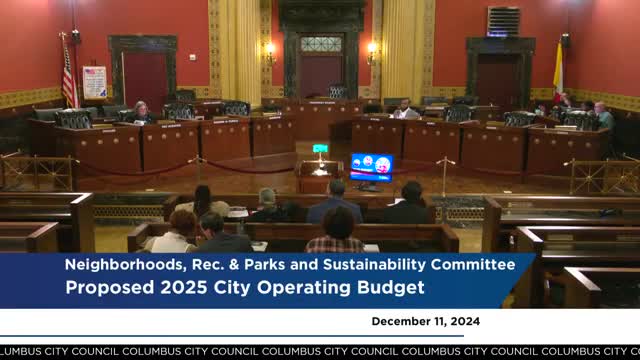Recreation & Parks requests $79.6 million for 2025; directors highlight youth outreach and hospital-based violence intervention
Get AI-powered insights, summaries, and transcripts
Subscribe
Summary
Rec & Parks proposed a $79,635,596 2025 budget, including funds for staffing 455 full‑time positions, operations for the new Fran Ryan Center and citywide youth programs; the department said $335,000 in training and travel was cut and several operating requests remain unapproved.
The Department of Recreation and Parks presented a $79,635,596 proposed operating budget for 2025 that the department said would fund recreation programming, parks maintenance and several violence‑intervention and youth initiatives.
Elaine Hostetler, fiscal manager for Recreation and Parks, told the committee the department’s budget is a 6% increase over 2024 and includes $53,800,000 for personnel expenses to support 455 full‑time and 1,007 part‑time authorized positions. “Of the two sides of Recreation and Parks, 77 percent of our operating budget goes towards recreation programming for the public and 23% is dedicated to the maintenance and preservation of our parks and natural spaces,” Hostetler said.
Hostetler listed notable operating costs: $710,000 for police and private security at facilities and events; approximately $4,900,000 for utilities across dozens of facilities; $630,000 for field and pool chemicals; $158,000 for youth transportation; and $2,300,000 for fleet costs. She said revenue projections of about $19,700,000 factor in increased program fees tied to the new Fran Ryan Center and higher golf‑course usage.
Program highlights and funding gaps
Hostetler said a total of $335,000 in training and travel funding was eliminated as a cost‑saving measure; she warned this will force the department to reallocate other funds to certify lifeguards, pesticide applicators, arborists and other staff who require annual recertification. The budget also includes a $965,000 approved expansion to move certain items from capital to operating under new city auditor guidance.
The department requested, but did not receive approval for, $1,900,000 to fund 20 full‑time positions supporting neighborhood violence intervention programs Reroute and Voice after ARPA funding phases out; the request also included $640,000 to operate the new Fran Ryan Center (opening January 8) with five full‑time positions and 12 part‑time positions and $60,000 for supplies and services.
Voice hospital program and Center Without Walls
Program manager Thad Alexander described Voice, a hospital‑based intervention program (HVIP) that began in 2020. Voice partners with Grant Medical Center, Riverside and, in 2024, Nationwide Children’s Hospital to provide bedside case management and wraparound services for gunshot and assault victims. Alexander said Voice’s objective is “no revictimization and no retaliation” and presented anonymized success stories of participants who received relocation support, therapeutic recreation and counseling after serious injuries.
Alex Pasas, administrative manager for youth programming, highlighted the Center Without Walls initiative, which expanded from one school in 2018 to programs in 10 schools and 16 total sites across all quadrants of the city. Pasas said participation and registration increased substantially year‑over‑year: participation was up 73% and registration increased 35% from 2023 to 2024 according to his presentation.
Council questions and implications
Councilmembers pressed director and staff on how the loss of training dollars could affect essential certifications and pool operations; Hostetler said Red Cross lifeguard, CPR and other safety certifications will need to be covered from other departmental funds if the cuts stand. Members also asked about operating plans for the Fran Ryan Center and how the department will meet needs if requested positions remain unfunded.
Closing
Department leaders said they will continue to work with council during budget amendment discussions. The department emphasized the reliance of many residents on non‑capital programs — summer youth, therapeutic recreation and hospital‑linked intervention — that would be affected if operating requests are not approved.
